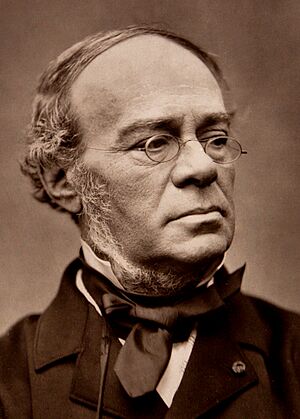Fromental Halévy facts for kids
Jacques-François-Fromental-Élie Halévy, known as Fromental Halévy, was a French composer. He was born on May 27, 1799, and passed away on March 17, 1862. Today, he is mostly remembered for his famous opera La Juive.
Contents
Early Life and Musical Training
Halévy was born in Paris, France. His father, Élie Halfon Halévy, was a Jewish cantor (a singer who leads prayers in a synagogue) and a teacher. His mother was also French Jewish. The name "Fromental" means 'oat grass' and was given to him because he was born on a day named after that plant in the old French calendar.
He started studying music at the Conservatoire de Paris when he was only nine or ten years old. He became a student and later a special protégé of the famous composer Luigi Cherubini. In 1819, after trying twice, Halévy won the important Prix de Rome award for his music.
One of his first public successes was a special piece of music called a Marche Funèbre et De Profundis en Hébreu. He wrote it for a public service in memory of a French duke who had been assassinated. This piece, which had a strong religious feeling, made people notice the young composer.
Halévy worked as a chorus master (the person who trains and leads a choir) at the Théâtre Italien and later at the Opéra. He also became a professor at the Conservatoire de Paris, teaching harmony, counterpoint, and composition. Many students who later became famous learned from him.
The Success of La Juive
In 1835, Halévy had his biggest success with his opera La Juive (which means 'The Jewish Woman'). This opera became a very important work in French music for many years. The main male role, Eléazar, was a favorite for famous tenors (male singers with high voices), like Enrico Caruso.
One of the most well-known songs from the opera is Eléazar's "Rachel, quand du Seigneur." Even the famous composer Hector Berlioz mentioned its unique sound in his book about instruments. La Juive is a "grand opera," meaning it has large choruses, impressive scenes, and big celebrations. The story is quite dramatic, ending with the heroine facing a terrible fate.
Many famous composers admired La Juive. Gustav Mahler said he was "absolutely overwhelmed by this wonderful, majestic work" and thought it was "one of the greatest operas ever created." Even Richard Wagner, another famous composer, wrote good things about Halévy's operas.
Later Career and Other Works
After the success of La Juive, Halévy was elected to the Institut de France in 1836, which was a great honor. While La Juive was his biggest hit, some of his other operas, like L'Éclair, La reine de Chypre, and Charles VI, were also well-received by critics and audiences.
Halévy became an important figure in the arts world, taking on many administrative roles. He was the Secretary of the Académie des Beaux-Arts and led committees that decided on musical standards and awarded prizes. The artist Eugène Delacroix noted in his diary that Halévy seemed very busy and worn out by his many duties.
In 1849, Halévy's cantata Prométhée enchaîné was performed. This piece is special because it is considered one of the first major Western orchestral works to use quarter tones (musical notes that are smaller than the usual half-steps).
Halévy passed away in 1862 in Nice, France, at the age of 62. He left his last opera, Noé, unfinished. His former student, Georges Bizet, later completed it, but it was not performed until after Bizet's own death.
Halévy's Family
Halévy's wife, Léonie, was 20 years younger than him. After his death, she recovered from some health challenges she had faced during their marriage and became a talented sculptor.
Their daughter, Geneviève, married the composer Georges Bizet in 1869. Bizet had been one of Halévy's students. After Bizet's death, Geneviève married a banker and became a well-known hostess in Parisian society, holding famous gatherings called "salons." The young writer Marcel Proust was a guest at her parties and used her as inspiration for a character in his famous novel In Search of Lost Time.
Halévy's brother, Léon Halévy, was a writer and historian. Léon's son, Ludovic Halévy, became a famous writer of opera stories (librettist). He wrote the stories for many French operas, including Bizet's Carmen and Jacques Offenbach's Orpheus in the Underworld.
List of Operas
Halévy wrote about forty operas in total, including:
- L'Artisan (1827)
- Le Roi et le batelier (1827)
- Clari (1828)
- Le dilettante d'Avignon (1829)
- Attendre et courir (1830)
- La Langue musicale (1830)
- La tentation (1832)
- Les Souvenirs de Lafleur (1833)
- Ludovic (1833)
- La Juive (1835)
- L'éclair (1835)
- Guido et Ginevra (1838)
- Les Treize (1839)
- Le shérif (1839)
- Le Drapier (1839)
- Le Guitarréro (1841)
- La reine de Chypre (1841)
- Charles VI (1843)
- Le lazzarone, ou Le bien vient en dormant (1844)
- Les Mousquetaires de la reine (1846)
- Les Premiers pas (1847)
- Le val d'Andorre (1848)
- La Fée aux roses (1849)
- La Tempesta (1850)
- La Dame de pique (1850)
- Le Juif errant (1852)
- Le nabab (1853)
- Jaguarita l'Indienne (1855)
- L'Inconsolable (1855)
- Valentine d'Aubigny (1856)
- La magicienne (1858)
- Noé (1858–1862)
Halévy also composed music for ballets and cantatas (pieces for singers and orchestra).
See also
 In Spanish: Jacques Fromental Halévy para niños
In Spanish: Jacques Fromental Halévy para niños
 | William M. Jackson |
 | Juan E. Gilbert |
 | Neil deGrasse Tyson |


